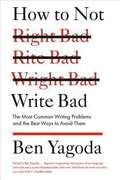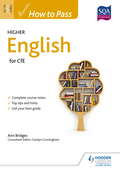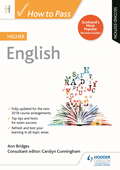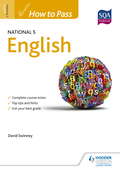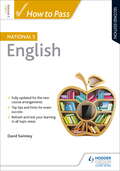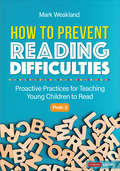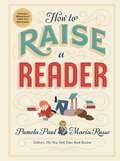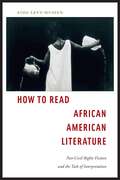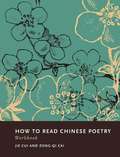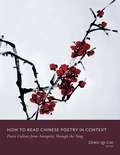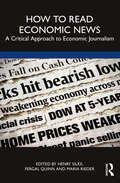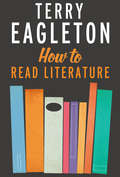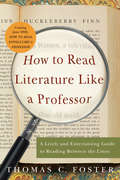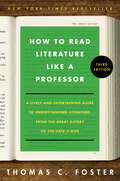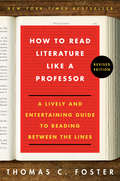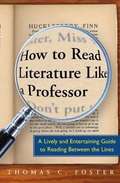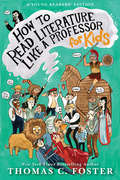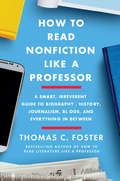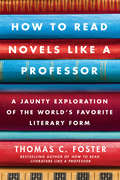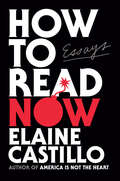- Table View
- List View
How to Not Write Bad: The Most Common Writing Problems and the Best Ways to Avoid Them
by Ben YagodaBen Yagoda's How to Not Write Bad illustrates how we can all write better, more clearly, and for a wider readership. He offers advice on what he calls "not-writing-badly," which consists of the ability, first, to craft sentences that are correct in terms of spelling, diction (word choice), punctuation, and grammar, and that also display clarity, precision, and grace. Then he focuses on crafting whole paragraphs-with attention to cadence, consistency of tone, sentence transitions, and paragraph length. In a fun, comprehensive guide, Yagoda lays out the simple steps we can all take to make our writing more effective, more interesting-and just plain better. .
How to Pass Higher English for CfE
by Ann BridgesGet your best grade with this guide to Higher English for CfE. We are working with SQA to gain endorsement for this title. This book contains all the advice and support you need to revise successfully for your Higher (for CfE) exam. It combines an overview of the course syllabus with advice from a top expert on how to improve exam performance, so you have the best chance of success. - Refresh your knowledge with complete course notes - Prepare for the exam with top tips and hints on revision techniques - Get your best grade with advice on how to gain those vital extra marks
How to Pass Higher English, Second Edition (How To Pass - Higher Level)
by Ann BridgesExam Board: SQA Level: Higher Subject: English First Teaching: August 2018 First Exam: May 2019Get your best grade with comprehensive course notes and advice from Scotland's top experts, fully updated for the latest changes to SQA Higher assessment. How to Pass Higher English Second Edition contains all the advice and support you need to revise successfully for your Higher exam. It combines an overview of the course syllabus with advice from a top expert on how to improve exam performance, so you have the best chance of success.- Revise confidently with up-to-date guidance tailored to the latest SQA assessment changes - Refresh your knowledge with comprehensive, tailored subject notes- Prepare for the exam with top tips and hints on revision techniques- Get your best grade with advice on how to gain those vital extra marks
How to Pass National 5 English
by David SwinneyGet your best grade with the SQA endorsed guide to National 5 English.This book contains all the advice and support you need to revise successfully for your National 5 exam. It combines an overview of the course syllabus with advice from a top expert on how to improve exam performance, so you have the best chance of success. Refresh your knowledge with complete course notes Prepare for the exam with top tips and hints on revision technique Get your best grade with advice on how to gain those vital extra marks
How to Pass National 5 English, Second Edition
by David SwinneyExam Board: SQALevel: National 5Subject: EnglishFirst Teaching: September 2017First Exam: Summer 2018This book contains all the advice and support you need to revise successfully for your National 5 exam. It combines an overview of the course syllabus with advice from a top expert on how to improve exam performance, so you have the best chance of success.- Refresh your knowledge with complete course notes- Prepare for the exam with top tips and hints on revision technique- Get your best grade with advice on how to gain those vital extra marks
How to Pass National 5 English: Second Edition
by David SwinneyExam Board: SQALevel: National 5Subject: EnglishFirst Teaching: August 2017First Exam: May 2018This book contains all the advice and support you need to revise successfully for your National 5 exam. It combines an overview of the course syllabus with advice from a top expert on how to improve exam performance, so you have the best chance of success.- Refresh your knowledge with complete course notes- Prepare for the exam with top tips and hints on revision technique- Get your best grade with advice on how to gain those vital extra marks
How to Prevent Reading Difficulties, Grades PreK-3: Proactive Practices for Teaching Young Children to Read (Corwin Literacy)
by Mark WeaklandThe science of reading meets the art of teaching readers Do you have the knowledge and instructional ability to effectively teach foundational skills and to support students who show signs of reading difficulties? It is a tall order — and one that challenges many new and veteran teachers. How to Prevent Reading Difficulties, Grades PreK-3 builds on decades of evidence and years of experience to help teachers understand how the brain learns to read and how to apply that understanding to Tier 1 instruction. The book includes: step-by-step descriptions of techniques for effectively teaching phonological awareness, spelling, phonics, vocabulary, and comprehension specific Tier 1 activities, routines, and frameworks that build and strengthen word recognition and language comprehension links to video demonstrations and online resources clear, practical explanations of the science of reading, including the Eternal Triangle and the Simple View of Reading, to help teachers understand the fundamentals of the reading process, recognize how difficulties arise – and understand how to address them A book study guide is available on the Free Resources tab to provides group guidance on how to effectively teach foundational skills and to support students who show signs of reading difficulties. Author Mark Weakland brings new energy to teaching high-priority foundational skills. By blending the science of reading with the best instructional practices that lead to authentic reading—the ultimate goal of balanced literacy—teachers can prevent many reading difficulties in K-3 learners.
How to Prevent Reading Difficulties, Grades PreK-3: Proactive Practices for Teaching Young Children to Read (Corwin Literacy)
by Mark WeaklandThe science of reading meets the art of teaching readers Do you have the knowledge and instructional ability to effectively teach foundational skills and to support students who show signs of reading difficulties? It is a tall order — and one that challenges many new and veteran teachers. How to Prevent Reading Difficulties, Grades PreK-3 builds on decades of evidence and years of experience to help teachers understand how the brain learns to read and how to apply that understanding to Tier 1 instruction. The book includes: step-by-step descriptions of techniques for effectively teaching phonological awareness, spelling, phonics, vocabulary, and comprehension specific Tier 1 activities, routines, and frameworks that build and strengthen word recognition and language comprehension links to video demonstrations and online resources clear, practical explanations of the science of reading, including the Eternal Triangle and the Simple View of Reading, to help teachers understand the fundamentals of the reading process, recognize how difficulties arise – and understand how to address them A book study guide is available on the Free Resources tab to provides group guidance on how to effectively teach foundational skills and to support students who show signs of reading difficulties. Author Mark Weakland brings new energy to teaching high-priority foundational skills. By blending the science of reading with the best instructional practices that lead to authentic reading—the ultimate goal of balanced literacy—teachers can prevent many reading difficulties in K-3 learners.
How to Publish Your Own Book: Secrets from the Inside
by Stewart FerrisWhen you've written a book you want to see it in print. You want people to read and enjoy it. The only thing standing in your way is the publishing industry which rejects 98 per cent of the manuscripts submitted to it. Why not skip months of collecting rejection slips and simply join them at their own game? Anyone can publish their own book, and the cost can be as little as zero. In this easy-to-use guide, Stewart Ferris explains everything you need to know to be able to convert your manuscript into a printed book and to get that book selling in the shops, or to sell it online as an eBook. Stewart created the UK's first self-publishing agency in 1993 with his business partner Alastair Williams, offering authors all the services and advice they needed to publish and sell their own books.
How to Publish Your Own Book: Secrets from the Inside
by Stewart FerrisWhen you've written a book you want to see it in print. You want people to read and enjoy it. The only thing standing in your way is the publishing industry which rejects 98 per cent of the manuscripts submitted to it. Why not skip months of collecting rejection slips and simply join them at their own game? Anyone can publish their own book, and the cost can be as little as zero. In this easy-to-use guide, Stewart Ferris explains everything you need to know to be able to convert your manuscript into a printed book and to get that book selling in the shops, or to sell it online as an eBook. Stewart created the UK's first self-publishing agency in 1993 with his business partner Alastair Williams, offering authors all the services and advice they needed to publish and sell their own books.
How to Raise a Reader
by Pamela Paul Maria RussoAn indispensable guide to welcoming children—from babies to teens—to a lifelong love of reading, written by Pamela Paul and Maria Russo, editors of The New York Times Book Review. Do you remember your first visit to where the wild things are? How about curling up for hours on end to discover the secret of the Sorcerer’s Stone? Combining clear, practical advice with inspiration, wisdom, tips, and curated reading lists, How to Raise a Reader shows you how to instill the joy and time-stopping pleasure of reading. Divided into four sections, from baby through teen, and each illustrated by a different artist, this book offers something useful on every page, whether it’s how to develop rituals around reading or build a family library, or ways to engage a reluctant reader. A fifth section, “More Books to Love: By Theme and Reading Level,” is chockful of expert recommendations. Throughout, the authors debunk common myths, assuage parental fears, and deliver invaluable lessons in a positive and easy-to-act-on way.
How to Read African American Literature: Post-Civil Rights Fiction and the Task of Interpretation
by Aida Levy-HussenHow to Read African American Literature offers a series of provocations to unsettle the predominant assumptions readers make when encountering post-Civil Rights black fiction. Foregrounding the large body of literature and criticism that grapples with legacies of the slave past, Aida Levy-Hussen’s argument develops on two levels: as a textual analysis of black historical fiction, and as a critical examination of the reading practices that characterize the scholarship of our time. Drawing on psychoanalysis, memory studies, and feminist and queer theory, Levy-Hussen examines how works by Toni Morrison, David Bradley, Octavia Butler, Charles Johnson, and others represent and mediate social injury and collective grief. In the criticism that surrounds these novels, she identifies two major interpretive approaches: “therapeutic reading” (premised on the assurance that literary confrontations with historical trauma will enable psychic healing in the present), and “prohibitive reading” (anchored in the belief that fictions of returning to the past are dangerous and to be avoided). Levy-Hussen argues that these norms have become overly restrictive, standing in the way of a more supple method of interpretation that recognizes and attends to the indirect, unexpected, inconsistent, and opaque workings of historical fantasy and desire. Moving beyond the question of whether literature must heal or abandon historical wounds, Levy-Hussen proposes new ways to read African American literature now.
How to Read Chinese Poetry Workbook
by Cai Zong-Qi Jie CuiDesigned to work with the acclaimed course text How to Read Chinese Poetry: A Guided Anthology, the How to Read Chinese Poetry Workbook introduces classical Chinese to advanced beginners and learners at higher levels, teaching them how to appreciate Chinese poetry in its original form. Also a remarkable stand-alone resource, the volume illuminates China's major poetic genres and themes through one hundred well-known, easy-to-recite works. Each of the volume's twenty units contains four to six classical poems in Chinese, English, and tone-marked pinyin romanization, with comprehensive vocabulary notes and prose poem translations in modern Chinese. Subsequent comprehension questions and comments focus on the artistic aspects of the poems, while exercises test readers' grasp of both classical and modern Chinese words, phrases, and syntax. An extensive glossary cross-references classical and modern Chinese usage, characters and compounds, and multiple character meanings, and online sound recordings are provided for each poem and its prose translation free of charge. A list of literary issues addressed throughout completes the volume, along with phonetic transcriptions for entering-tone characters, which appear in Tang and Song-regulated shi poems and lyric songs.
How to Read Chinese Poetry in Context: Poetic Culture from Antiquity Through the Tang (How to Read Chinese Literature)
by Edited by Zong-Qi CaiHow to Read Chinese Poetry in Context is an introduction to the golden age of Chinese poetry, spanning the earliest times through the Tang dynasty (618–907). It aims to break down barriers—between language and culture, poetry and history—that have stood in the way of teaching and learning Chinese poetry. Not only a primer in early Chinese poetry, the volume demonstrates the unique and central role of poetry in the making of Chinese culture. Each chapter focuses on a specific theme to show the interplay between poetry and the world. Readers discover the key role that poetry played in Chinese diplomacy, court politics, empire building, and institutionalized learning; as well as how poems shed light on gender and women’s status, war and knight-errantry, Daoist and Buddhist traditions, and more. The chapters also show how people of different social classes used poetry as a means of gaining entry into officialdom, creating self-identity, fostering friendship, and airing grievances. The volume includes historical vignettes and anecdotes that contextualize individual poems, investigating how some featured texts subvert and challenge the grand narratives of Chinese history. Presenting poems in Chinese along with English translations and commentary, How to Read Chinese Poetry in Context unites teaching poetry with the social circumstances surrounding its creation, making it a pioneering and versatile text for the study of Chinese language, literature, history, and culture.
How to Read Economic News: A Critical Approach to Economic Journalism
by Maria Rieder Henry Silke Fergal QuinnClosely examining how the news media reports economic and financial matters, this book equips students with solid methodological skills for reading and interpreting the news alongside a toolkit for best practice as an economic journalist. How to Read Economic News combines theory and practice to explore the discourse surrounding economics in the mass media and how this specialised form of reporting can be improved. Beginning by introducing major concepts such as financialised economic reporting, media amnesia and loss of trust, the book goes on to help students to interpret, understand and analyse existing news discourse and to identify subtle biases in news reports stemming from hegemonic belief systems. The final section puts this analytical knowledge into practice, providing students with methods for the critical production of news and covering such skills as identifying newsworthiness, story sourcing, achieving clarity, and using complex datasets in news stories. This is a key text for students and academics in the fields of financial journalism and critical discourse analysis who wish to approach the subject with a critical eye.
How to Read Like You Mean It (Cultural Dialectics)
by Kyle ConwayIn this candid and concise volume, Kyle Conway, author of The Art of Communication in a Polarized World, considers how we can open ourselves to others and to ideas that scare us by reading difficult texts. Conway argues that because we resist ideas we don’t understand, we must embrace confusion as a constitutive part of understanding and meaningful exchange, whether between a reader and a text or between two people. Building on the work of hermeneutics scholar Paul Ricoeur, Conway evaluates the recurring paradox of miscommunication that results in deeper understanding and proposes strategies for reading that will allow individuals give up the illusion of certainty. In elegant and compelling prose, Conway introduces readers to the idea that it is through uncertainty that we can gain access to new and meaningful worlds—those of texts and other people.
How to Read Literature
by Terry EagletonWhat makes a work of literature good or bad? How freely can the reader interpret it? Could a nursery rhyme like Baa Baa Black Sheep be full of concealed loathing, resentment, and aggression? In this accessible, delightfully entertaining book, Terry Eagleton addresses these intriguing questions and a host of others. How to Read Literature is the book of choice for students new to the study of literature and for all other readers interested in deepening their understanding and enriching their reading experience.In a series of brilliant analyses, Eagleton shows how to read with due attention to tone, rhythm, texture, syntax, allusion, ambiguity, and other formal aspects of literary works. He also examines broader questions of character, plot, narrative, the creative imagination, the meaning of fictionality, and the tension between what works of literature say and what they show. Unfailingly authoritative and cheerfully opinionated, the author provides useful commentaries on classicism, Romanticism, modernism, and postmodernism along with spellbinding insights into a huge range of authors, from Shakespeare and J. K. Rowling to Jane Austen and Samuel Beckett.
How to Read Literature Like a Professor
by Thomas C. FosterWhat does it mean when a fictional hero takes a journey?. Shares a meal? Gets drenched in a sudden rain shower? Often, there is much more going on in a novel or poem than is readily visible on the surface--a symbol, maybe, that remains elusive, or an unexpected twist on a character--and there's that sneaking suspicion that the deeper meaning of a literary text keeps escaping you.In this practical and amusing guide to literature, Thomas C. Foster shows how easy and gratifying it is to unlock those hidden truths, and to discover a world where a road leads to a quest; a shared meal may signify a communion; and rain, whether cleansing or destructive, is never just rain. Ranging from major themes to literary models, narrative devices, and form, How to Read Literature Like a Professor is the perfect companion for making your reading experience more enriching, satisfying, and fun.
How to Read Literature Like a Professor 3E: A Lively and Entertaining Guide to Understanding Literature, from The Great Gatsby to The Hate You Give
by Thomas C FosterThoroughly revised and expanded for a new generation of readers, this classic guide to enjoying literature to its fullest—a lively, enlightening, and entertaining introduction to a diverse range of writing and literary devices that enrich these works, including symbols, themes, and contexts—teaches you how to make your everyday reading experience richer and more rewarding. While books can be enjoyed for their basic stories, there are often deeper literary meanings beneath the surface. How to Read Literature Like a Professor helps us to discover those hidden truths by looking at literature with the practiced analytical eye—and the literary codes—of a college professor.What does it mean when a protagonist is traveling along a dusty road? When he hands a drink to his companion? When he’s drenched in a sudden rain shower? Thomas C. Foster provides answers to these questions as he explores every aspect of fiction, from major themes to literary models, narrative devices, and form. Offering a broad overview of literature—a world where a road leads to a quest, a shared meal may signify a communion, and rain, whether cleansing or destructive, is never just a shower—he shows us how to make our reading experience more intellectually satisfying and fun.The world, and curricula, have changed. This third edition has been thoroughly revised to reflect those changes, and features new chapters, a new preface and epilogue, as well as fresh teaching points Foster has developed over the past decade. Foster updates the books he discusses to include more diverse, inclusive, and modern works, such as Angie Thomas’s The Hate U Give; Emily St. John Mandel’s Station Eleven; Neil Gaiman’s Neverwhere; Elizabeth Acevedo’s The Poet X; Helen Oyeyemi's Mr. Fox and Boy, Snow, Bird; Sandra Cisneros’s The House on Mango Street; Zora Neale Hurston’s Their Eyes Were Watching God; Maggie O’Farrell’s Hamnet; Madeline Miller’s Circe; Pat Barker’s The Silence of the Girls; and Tahereh Mafi’s A Very Large Expanse of Sea.
How to Read Literature Like a Professor Revised: A Lively and Entertaining Guide to Reading Between the Lines
by Thomas C. FosterA thoroughly revised and updated edition of Thomas C. Foster's classic guide--a lively and entertaining introduction to literature and literary basics, including symbols, themes, and contexts--that shows you how to make your everyday reading experience more rewarding and enjoyable.While many books can be enjoyed for their basic stories, there are often deeper literary meanings interwoven in these texts. How to Read Literature Like a Professor helps us to discover those hidden truths by looking at literature with the eyes--and the literary codes--of the ultimate professional reader: the college professor.What does it mean when a literary hero travels along a dusty road? When he hands a drink to his companion? When he's drenched in a sudden rain shower? Ranging from major themes to literary models, narrative devices, and form, Thomas C. Foster provides us with a broad overview of literature--a world where a road leads to a quest, a shared meal may signify a communion, and rain, whether cleansing or destructive, is never just a shower--and shows us how to make our reading experience more enriching, satisfying, and fun.This revised edition includes new chapters, a new preface, and a new epilogue, and incorporates updated teaching points that Foster has developed over the past decade.
How to Read Literature Like a Professor: A Lively and Entertaining Guide to Reading Between the Lines
by Thomas C. FosterThe author, Thomas C. Foster, wrote the following about his book: "What this book represents is not a database of all the cultural codes by which writers create and readers understand the products of that creation, but a template, a pattern, a grammar of sorts from which you can learn to look for those codes on your own." Other people have commented about the book: The author focuses on the basics of literary criticism ... "major themes and motifs (seasons, quests, food, politics, geography, weather, vampires, violence, illness, and many more); literary models (Shakespeare's plays, Greek mythology, fairy tales, the Bible); and narrative devices (form, irony, plot, and symbol, among others)." To make his work lively and entertaining the author: "draws on a huge variety of examples from all genres: novels, short stories, plays, poems, movies, song lyrics, and cartoons." In one of the final chapters of the book, the author: "encourages readers to test their knowledge on the short story 'The Garden Party' by Katherine Mansfield, offering [his] comments and ideas along the way." Finally, Foster provides an extensive bibliography of works that he hopes that the readers will read in order to practice the literary analytical tools taught in the book.
How to Read Literature Like a Professor: For Kids
by Thomas C. FosterNow there's a young readers' edition of the hit New York Times bestselling adult book that's sold more than 750,000 copies! Did you know the Grinch was on a quest? What does it mean when a hero takes a journey? Or eats green eggs and ham? And what are vampires really about? There's always more to a story than you think! This is the funny and accessible go-to guide that unlocks the secrets of reading!
How to Read Nonfiction Like a Professor: A Smart, Irreverent Guide to Biography, History, Journalism, Blogs, and Everything in Between
by Thomas C FosterThe New York Times bestselling author of How to Read Literature Like a Professor uses the same skills to teach how to access accurate information in a rapidly changing 24/7 news cycle and become better readers, thinkers, and consumers of media.We live in an information age, but it is increasingly difficult to know which information to trust. Fake news is rampant in mass media, stoked by foreign powers wishing to disrupt a democratic society. We need to be more perceptive, more critical, and more judicious readers. The future of our republic may depend on it. How to Read Nonfiction Like a Professor is more careful, more attentive, more aware reading. On bookstore shelves, one book looks as authoritative as the next. Online, posts and memes don’t announce their relative veracity. It is up to readers to establish how accurate, how thorough, how fair material may be. After laying out general principles of reading nonfiction, How to Read Nonfiction Like a Professor offers advice for specific reading strategies in various genres from histories and biographies to science and technology to social media. Throughout, the emphasis will be on understanding writers’ biases, interrogating claims, analyzing arguments, remaining wary of broad assertions and easy answers, and thinking critically about the written and spoken materials readers encounter. We can become better citizens through better reading, and the time for that is now.
How to Read Novels Like a Professor
by Thomas C. FosterOf all the literary forms, the novel is arguably the most discussed . . . and fretted over. From Miguel de Cervantes's Don Quixote to the works of Jane Austen, F. Scott Fitzgerald, Ernest Hemingway, and today's masters, the novel has grown with and adapted to changing societies and technologies, mixing tradition and innovation in every age throughout history.Thomas C. Foster--the sage and scholar who ingeniously led readers through the fascinating symbolic codes of great literature in his first book, How to Read Literature Like a Professor--now examines the grammar of the popular novel. Exploring how authors' choices about structure--point of view, narrative voice, first page, chapter construction, character emblems, and narrative (dis)continuity--create meaning and a special literary language, How to Read Novels Like a Professor shares the keys to this language with readers who want to get more insight, more understanding, and more pleasure from their reading.
How to Read Now: Essays
by Elaine Castillo"Energetically brilliant, warmly humane, incisively funny, it whips the tablecloth from under the setting of contemporary reading, politics and intellectual culture in a literary act of daring.&” —Andrew Sean Greer, Pulitzer Prize winning author of Less An exploration and polemic that redefines the power and potential for reading by a novelist whose &“prose is as good as it gets&” (NPR) and who has &“a real voice: vernacular and fluid, with a take-no-prisoners edge&” (Kirkus)How many times have we heard that reading builds empathy? That we can travel through books? How often have we were heard about the importance of diversifying our bookshelves? Or claimed that books saved our lives? These familiar words—beautiful, aspirational—are sometimes even true. But award-winning novelist Elaine Castillo has more ambitious hopes for our reading culture, and in this collection of linked essays, &“she moves to wrest reading away from the cotton-candy aspirations of uniting people in empathetic harmony and reposition it as thornier, ultimately more rewarding work.&” (Vulture) How to Read Now explores the politics and ethics of reading, and insists that we are capable of something better: a more engaged relationship not just with our fiction and our art, but with our buried and entangled histories. Smart, funny, galvanizing, and sometimes profane, Castillo attacks the stale questions and less-than-critical proclamations that masquerade as vital discussion: reimagining the cartography of the classics, building a moral case against the settler colonialism of lauded writers like Joan Didion, taking aim at Nobel Prize winners and toppling indie filmmakers, and celebrating glorious moments in everything from popular TV like The Watchmen to the films of Wong Kar-wai and the work of contemporary poets like Tommy Pico. At once a deeply personal and searching history of one woman&’s reading life, and a wide-ranging and urgent intervention into our globalized conversations about why reading matters today, How to Read Now empowers us to embrace a more complicated, embodied form of reading, inviting us to acknowledge complicated truths, ignite surprising connections, imagine a more daring solidarity, and create space for a riskier intimacy—within ourselves, and with each other.
